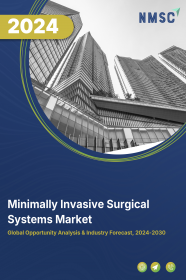
Minimally Invasive Surgical Systems Market by Product (Surgical Robotic Systems, Conventional Minimally Invasive Surgical Equipment, Endoscopy, Laparoscopy, Operating Room (OR) Systems and Others), by End-user (Hospitals, Ambulatory Surgical Centres, Clinics, and Others) – Global Opportunity Analysis and Industry Forecast, 2024–2030
Industry: Healthcare | Publish Date: 30-Nov-2024 | No of Pages: 302 | No. of Tables: 179 | No. of Figures: 144 | Format: PDF | Report Code : HC482
US Tariff Impact on Minimally Invasive Surgical Systems Market
Trump Tariffs Are Reshaping Global Business
Market Overview
The global Minimally Invasive Surgical Systems Market size was valued at USD 33.22 billion in 2023 and is predicted to reach USD 56.21 billion by 2030, with a CAGR of 7.8% from 2024 to 2030. Minimally invasive surgery involves surgical interventions through small incisions, using specialized instruments and technologies such as endoscopes and robotic systems.
The market encompasses a range of products, including surgical robotic systems, conventional minimally invasive surgical equipment, endoscopy tools, laparoscopy instruments, and others. These products enable surgeons to perform procedures with reduced trauma to the patient, leading to shorter recovery times, decreased postoperative pain, and minimized scarring. These systems play a crucial role in various medical specialties, including gynecology, orthopedics, cardiovascular surgery, and more. As technological innovations continue to evolve, the minimally invasive surgical systems market contributes to advancements in medical practices, ultimately benefiting both healthcare professionals and patients.
Global rise in Chronic Diseases boosts the Market Growth
The increasing prevalence of chronic diseases, including cardiovascular diseases, cancer, and obesity, has significantly heightened the demand for minimally invasive surgical interventions. As these health conditions become more widespread globally, there is a growing necessity for effective and less invasive treatment options that can address complex medical issues with reduced risks and complications.
According to a report published by the World Health Organization (WHO) in September 2023, non-communicable diseases (NCDs) have caused 41 million deaths yearly, equal to 74% worldwide. Among NCDs, cardiovascular diseases caused 17.9 million deaths annually, followed by chronic respiratory diseases (4.1 million) and diabetes (including diabetes-related kidney disease), causing 2 million deaths.
Minimally invasive surgical systems offer a viable solution, allowing medical professionals to perform intricate procedures through small incisions or natural body openings. This approach not only minimizes the physical trauma associated with traditional open surgeries but also accelerates patient recovery times.
The Surging Old-Age Population is Fueling the Market
The aging population is a significant driver for the growth of the minimally invasive surgical systems market as people age, they experience a higher incidence of health conditions that necessitate surgical interventions. Minimally invasive procedures are particularly favored among the elderly due to their reduced risks and faster recovery times compared to traditional open surgeries. With an aging demographic globally, there is an increasing demand for medical solutions that cater to the unique healthcare needs of older individuals. Minimally invasive surgical systems offer suitable options for the elderly, allowing for precise and effective treatments with minimized trauma.
According to the latest report published by the World Health Organization (WHO) in 2022, the number of people above 60 reached 1.4 billion in 2020, which is anticipated to reach 2.1 billion by 2050.
This demographic trend has led to a surge in the adoption of minimally invasive technologies, as healthcare providers strive to meet the growing demand for safer and more efficient surgical interventions tailored to the aging population. As the elderly demographic continues to expand, the minimally invasive surgical systems market is poised to see sustained growth driven by the need for advanced medical solutions that address the specific challenges associated with aging.
High Initial Costs Restrain the Market Growth
The high initial cost of acquiring and implementing minimally invasive surgical systems constitutes a significant restraint on the market's growth. The procurement expenses associated with purchasing advanced robotic systems, coupled with the need for comprehensive training programs for healthcare professionals and infrastructure adaptations, contribute to the formidable financial barrier. Healthcare institutions, operating within constrained budgets find the substantial upfront investment challenging which hinders the overall growth of the market.
The Integration of AI in Surgical Robotics creates Future Opportunity
The integration of AI in surgical robotics represents a significant opportunity for the minimally invasive surgical systems market as AI plays a crucial role in optimizing surgical workflows by providing real-time data analysis, allowing surgeons to make informed decisions during procedures. The utilization of AI in minimally invasive surgical systems also contributes to the development of smart instruments and devices. These intelligent tools offer features such as autonomous navigation, adaptive control, and real-time feedback, further augmenting the capabilities of surgeons and improving patient outcomes.
Moreover, the integration of AI in surgical robotics not only enhances the capabilities of minimally invasive surgical systems but also opens up new avenues for innovation, improved patient care, and increased efficiency in the healthcare industry. Thus, technological advancement presents a promising future for the growth and development of the minimally invasive surgical systems market.
For instance, in September 2023, US Medical Innovations (USMI) and the Jerome Canady Research Institute for Advanced and Biological Technological Sciences (JCRI-ABTS) launched the new Canady Robotic AI Surgical System. It is claimed to be the world’s first artificial intelligence (AI) robotic system that generates cold atmospheric plasma (CAP), and a three-dimensional non-contact bioelectric pulse electromagnetic field.
North America dominates the Minimally Invasive Surgical Systems Market
North America holds the dominant share of the minimally invasive surgery market and is expected to continue its dominance during the forecast period. This is attributed to factors such as the growing prevalence of chronic diseases, such as cancer and obesity in countries such as the U.S. and Canada coupled with the growing demand for advanced medical treatments. According to the American Cancer Society Inc., an estimated 1.9 million new cancer cases were diagnosed and 608,570 cancer deaths were recorded in the U.S. in 2021.
Moreover, the presence of key market players, such as Stryker Corporation, Abbott Laboratories, Inc., and others plays a major role in the development of the minimally invasive surgery market in this region. These companies are undertaking strategic initiatives, making substantial investments in research and development, and as a result driving the growth of the market. For instance, in February 2022, Stryker launched the PROstep MICA SOLO Guide to simplify minimally invasive bunion procedures. Through this launch, the company aims to eliminate the need for additional surgical assistance during the operation by a solo surgeon.
Europe is expected to show Steady Growth in the Minimally Invasive Surgical Systems Market
Europe is expected to show a steady rise in the minimally invasive surgery market during the forecast period. The surge in demand for minimally invasive surgical systems in Europe can be attributed to the incorporation of advanced technologies that include robot-based surgery which offers advantages such as smaller incisions, reduced blood loss, and accelerated recovery times compared to traditional open surgery methods.
A notable illustration of this trend is evident in the introduction of the Versius Surgical Robotic System by CMR Surgical in Germany in February 2021. This surgical robot, specifically designed for minimally invasive surgery, aims to be both affordable and flexible, intending to enhance accessibility to robotic surgery for hospitals and surgeons which further contributes to the growth of the market in Germany.
Furthermore, various prominent universities and organizations across Europe are actively working to integrate robot-assisted surgery into hospitals, which further contributes towards the market growth. For instance, in September 2020, Manchester University NHS Foundation Trust (MFT) initiated its surgical robotics program, incorporating CMR Surgical's Versius robot at Manchester Royal Infirmary (MRI) hospital in the UK. This marked a significant milestone as the Versius robot became the first surgical robot utilized for minimal access surgery at the hospital. Initially employed for colorectal cancer surgery, the implementation of robotic systems in such medical institutions showcases a broader trend of increasing efforts to integrate robot-assisted surgery into healthcare practices across the continent. This collective endeavor contributes to the overall growth and adoption of minimally invasive surgical systems in Europe.
Competitive Landscape
Several market players operating in the minimally invasive surgical system industry include Medtronic plc, Johnson & Johnson, Stryker Corporation, Abbott Laboratories, Inc., Intuitive Surgical, B. Braun Melsungen AG, Smith & Nephew plc, Fujifilm Holdings Corporation, Zimmer Biomet Holdings, Inc., Siemens Healthineers AG. and others. These market players are adopting various strategies such as new product launches to maintain their dominance in the market.
For instance, in December 2022, Abbott launched a new minimally invasive device, “Transcatheter Aortic Valve Implantation (TAVI) System Navitor” for minimally invasive surgery. Through this launch, the company aims to treat heart valve diseases such as aortic stenosis, which is one of the most common and life-threatening heart valve diseases.
Also in October 2022, Medtronic plc secured approvals for its Hugo robotic-assisted surgery (RAS) system. These approvals encompass CE Mark clearance for general surgery, Health Canada license for general laparoscopic surgery, and Ministry of Health, Labor, and Welfare (MHLW) approval for urological and gynecological indications in Japan. These milestones pave the way for expanded access to minimally invasive surgery across Europe, North America, and Asia.
Minimally Invasive Surgical Systems Market Key Segments
By Product
-
Surgical Robotic Systems
-
Conventional Minimally Invasive Surgical Equipment
-
Endoscopy
-
Laparoscopy
-
Operating Room (OR) Systems
-
Others
By End User
-
Hospitals
-
Clinics
-
Ambulatory Surgical Centres
-
Others
By Region
-
North America
-
The U.S.
-
Canada
-
Mexico
-
-
Europe
-
The UK
-
Germany
-
Spain
-
France
-
Italy
-
Sweden
-
Russia
-
Netherlands
-
Belgium
-
Rest of Europe
-
-
Asia-Pacific
-
China
-
India
-
Japan
-
Australia
-
South Korea
-
Indonesia
-
Singapore
-
Malaysia
-
Rest of Asia-Pacific
-
-
Rest of the World (RoW)
-
South Africa
-
Brazil
-
Israel
-
Saudi Arabia
-
Turkey
-
UAE
-
Remaining Countries
-
REPORT SCOPE AND SEGMENTATION:
|
Parameters |
Details |
|
Market Size in 2023 |
USD 33.22 Billion |
|
Revenue Forecast in 2030 |
USD 56.21 Billion |
|
Growth Rate |
CAGR of 7.8% from 2024 to 2030 |
|
Analysis Period |
2023–2030 |
|
Base Year Considered |
2023 |
|
Forecast Period |
2024–2030 |
|
Market Size Estimation |
Billion (USD) |
|
Growth Factors |
|
|
Countries Covered |
29 |
|
Companies Profiled |
10 |
|
Market Share |
Available for 10 companies |
|
Customization Scope |
Free customization (equivalent up to 80 working hours of analysts) after purchase. Addition or alteration to country, regional, and segment scope. |
|
Pricing and Purchase Options |
Avail customized purchase options to meet your exact research needs. |
Key Players
-
Medtronic plc
-
Johnson & Johnson
-
Stryker Corporation
-
Abbott Laboratories, Inc.
-
Intuitive Surgical
-
B. Braun Melsungen AG
-
Smith & Nephew plc
-
Fujifilm Holdings Corporation
-
Zimmer Biomet Holdings, Inc
-
Siemens Healthineers AG

















 Speak to Our Analyst
Speak to Our Analyst





















